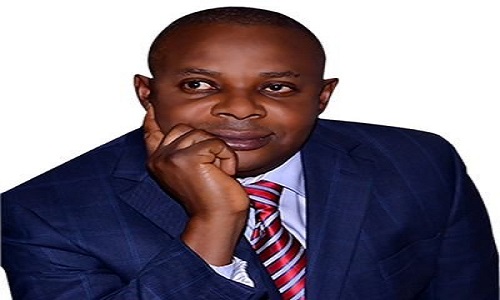Whatever your political persuasion or misgivings about him, truth is: Mr. James Faleke deserves our pity. But he also deserves our praise. Pity, because of the chain of circumstances that brought him face to face with providence and the blow it dealt him. A circuitous chord that has terminated adverse to his interest. And praise for the courage and gumption which he took to wage ‘war’ against his personal god. A battle which has been lost but not without shaping further our democratic experience and enriching our electoral jurisprudence; an area of our law in constant need of reforms. He comes across to us like the protagonist, Okonkwo in Chinua Achebe’s Things Fall Apart, who said yes, while his personal god thought otherwise. His only wish was to become the governor of Kogi state. But the gods had other plans. And to achieve their aim, set in motion a series of event that leaves the man helpless like a fish out of water; what reminds one of the tragic character— King Odewale in Ola Rotimi’s classic work, The gods are Not To Blame. Would he not have been the governor today if Abubakar Audu’s death took place sometime after the supplementary election? Why wasn’t he chosen to fly the flag of his Party after the demise of Audu? Why didn’t the courts find accommodation for him within the confines of section 187 of the constitution? The questions may never end. Providence alas, always finds her way.
Last Tuesday, anxiety hung on the air like the gathering of the cloud before a heavy pour. Ants ran amok in the pants of too many a kogi indigene. Though the sun may have risen in the east in its default style, but when it was setting in the evening, not everybody within the state enjoyed the ethereal beauty of the sunset. Why? A 7 man panel of the supreme court led by Justice Sylvester Ngwuta (JSC) had earlier in the day upheld the election of the incumbent governor, Yahaya Bello whose circumstance of emerging the governor of the confluence state, many would readily come to consensus was an act of sheer luck. And who says there is no element of luck in politics after the near legend of former president Goodluck Ebele Jonathan?
By the time the learned justices finally rose from the bench, it was the Yahaya Bello camp that took the glory of the day, while poor Faleke and co. were left with the tail wagging the dog. The judgement had not gone his way. Driving the last nail in the coffin of his gubernatorial ambition. It was indeed a last straw which visibly broke his back.
Too many of us are now familiar with the facts of this electoral war fare that would read like a political thriller. But suffice it to rehash the facts as it comes to our mind for the benefit of those who may not be at home with the chain of events. We recall that James Faleke became the running mate to the late Abubakar Audu at the Kogi state gubernatorial election scheduled for the 21st of November 2015 after the late Audu successfully coasted to victory at the primaries conducted by the All Progressives Congress (APC) with Yahaya Bello the runners-up in that particular election.
However, events were to take a drastic dimension when the said election became a victim of crass irregularities leading to its inconclusiveness in some local governments and subsequent postponement for another two weeks for election to be completed in the Local governments by the electoral umpire— INEC. This was well after the Audu-Faleke ticket had amassed a mammoth 240,000 votes. Tension was rife and permutations fever-pitch. Not long after the media went to town with the postponement of the election did Abubakar Audu, the big name on the ticket suffer death in controversial circumstances thereby setting the stage for the poor Faleke to take on what arguably would become the greatest legal tussle of his political cycle.
As hours became days leading to the rescheduled election, the APC was to go and put its house in order by sending a new name to the electoral umpire as to who shall become its flag bearer in lieu of Audu. All manners of politicking and gerrymandering were let loose and when the dust settled, Yahaya Bello became the favoured man to carry on from where Audu had stopped. He had come second at the primaries but a lot more went into consideration in coming to the choice of his candidacy with the usual suspect: politics of zoning, top on the list. The Ebira, a dominant ethnic group in Kogi state had never produced the governor. Yahaya Bello happens to be from this tribe. Every other thing was at best, secondary.
To cut the long story short, the supplementary polls soon came and it was almost a stroll for Bello to victory. But just as many had feared, a legal battle was in the offing; gathering momentum all the while. Faleke, obviously feeling cheated as according to him, he ought to have stepped into the shoes of his would-be boss, Abubakar Audu in honour of the ticket and not relegating him to play second fiddle to a man he described as an “interloper” reaping where he had not sown. He would not accept to deputize for Bello and approached the courts, the supposed last hope of the common man to see if any respite may come his way. Meanwhile, Yahaya Bello would later be sworn in and went down in history as the only governor to have taken the oath of office without a deputy. Faleke would not be seen at the event amidst all the pomp, let alone consider acting as a mere lieutenant.
The journey through the courts from the tribunal to the appellate court and finally ending at the supreme court last week was no doubt, a long, arduous and tortuous one. Suffering defeats at the lower courts would not daunt the man. He seemed so certain that a glimmer of light might be at the end of the judicial tunnel given the novelty of the issue at trial. Perhaps his legal team must have urged him on. And when justice Ngwuta dropped the gavel last week, that glimmer of light never came. That ‘justice’ he vociferously sought was nowhere to be seen. He must go back to the green chambers where he is a lawmaker to continue the business of making laws. May be this time, more seriously. Perhaps sponsor a bill that would cover the lacuna in our electoral instrument that set him on collision course with fate.
The apex court would not give the full ratio for coming to its verdict. It adjourned that business to the last day of September to tell us why it didn’t marvel the nation as it did 8 years ago in the Ameachi vs. Omehia debacle. While we now await that considered judgment, we must not put the court on trial here and now. That would be a trouble for another day. But more importantly, a turf for legal academics, the NBA and the Civil Society to dabble; but suffice it to pose the following questions: Couldn’t the court had relied on section 187 of the constitution as lead counsel for Faleke, Chief Wole Olanipekun (SAN) urged it , in order to secure a footing for Faleke? Why didn’t it heed the arguments of Chris Uche (SAN), legal practitioner to former governor Idris Wada , another party to the appeal in order to disqualify Bello for not having “gone through all the stages of the election” in the spirit of section 141 of the Electoral Act (2010) as amended? Could it be that the apex court merely invoked the “Ut res magit valuet quam peret” doctrine of Interpretation of Statutes to decide the matter as it did? Too many questions beg for answers, but let us not pre-empt the court.
Having said that, the biggest beneficiary of this legal warfare remains our democracy and legal jurisprudence. The case would no doubt join the pantheon of Ngige v Obi [2006]14NWLR(pt.999)1,Amaechi v INEC[2008]5 NWLR(pt. 1080)227, PPA v Saraki [2007]17 NWLR (pt.1064) 453 among other landmark electoral cases that have served to shape our jurisprudence and spurn a cavalcade of legal literature. For our democracy, it would send the message across borders that citizens still harbour confidence in the judiciary— that very important institution that gives life to any democracy, as the last hope of the common man and the bulwark of the civil rights of citizens.
The case further brings to fore, the pressing need for legal reforms. While it is true that there may never be a time when parliament would foresee every eventualities of everyday life of the society, parliament must remain proactive. The constitutional crisis generated by this case no doubt is a tacit mockery of our laws and the docility that has enveloped the institution that should churn out laws to keep the engine of state grinding. At a time when our senators are more interested in inanities such as budget padding and pointing accusatory fingers here and there, our laws must suffer the twin inexorable catharsis of redundancy and anachronism. This habitude must stop
James Faleke deserves our praise. The manner he bowed out is a stuff of legends. In reacting to the verdict the other day, the man went philosophical. Said him, “… I have no regrets challenging the decision to declare the election inconclusive as the step was taken in good faith to protect the interest of the over 240,000 electorates who voted for the Audu-Faleke ticket…” Of course, nothing could be further from the truth. His response is a lesson in standing for a cause we believe in, the enormity of odds notwithstanding. His resort the courts and not fomenting trouble qualifies him as a core democrat who believes in the rule of law and not might.
In concluding this intervention, we turn to the word of the immutable and irrepressible legal and judicial colossus, late Justice Ckukwudifu Akunne Oputa on the finality of the decision of the supreme court subject however to the proviso of overruling itself or nullification of its decision by legislation, as was enunciated in the celebrated case of Adegoke Motors Ltd v Adesanya& Anor (1989) 2 NSCC327 where the cerebral justice observed,
“We are final not because we are infallible rather we are infallible because we are final. Justices of this court are human beings, capable of erring. It will certainly be short-sighted arrogance not to accept this obvious truth. It is also trite that this court can do inestimable good through its wise decisions. Similarly it can do incalculable harm through its mistakes. When therefore it appears to learned counsel that any decision of this court has been given per incuriam, such counsel should have the courage and boldness to ask that such a decision be overruled. This court has the power to overrule itself (and has done so in the past) for it gladly accepts that it is better to admit error than to persevere in error”
On the strength of the above, we take the verdict of the Supreme Court as it comes as the authority when next a similar set of fact presents itself again until such a time when the apex court considers it fit to overrule itself on the strength of a superior argument canvassed by counsel. But in the mean time, we must not forget that it was James Faleke while ‘enthralled’ in a long dance with providence set all these legal stones in motion.
The writer, a legal practitioner and public affairs commentator wrote in from kano. Comments and reactions to [email protected] follow him on twitter @RayNkah




